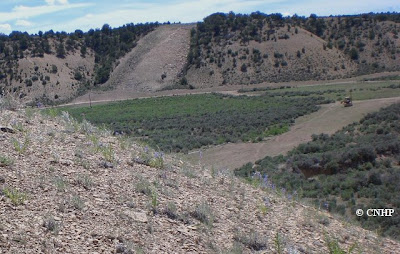 |
| Lesquerella congesta (Dudley Bluffs bladderpod), about the size of a half dollar, is restricted to Green River Shale. This formation contains the largest oil shale deposits in the world. |
The workshop was held in Vernal, Utah, a town whose economy is largely based on oil and gas development. In 2010, the Vernal BLM office, just west of the Colorado state line, received requests for 528 Applications for Permits to Drill (APD) in Uintah County alone (Utah Division of Oil, Gas and Mining). This year drilling operations have begun at 378 new wells. Next door, in Rio Blanco County, CO, 658 APDs have been approved this year, with 98 permits still pending (Colorado Oil and Gas Commission). This area of the country, which includes northeastern Utah, northwest Colorado, and southwest Wyoming, has recently been experiencing a boom in oil and gas development.
Here are a few highlights from the workshop:
Utah State University professor Douglas Jackson-Smith shared results from his sociological study in the Uintah Basin. Jackson-Smith interviewed stakeholders involved in the permitting process, and presented excerpts from these interviews. Those excerpts illustrated the frustrations behind the permitting process that are felt by all stakeholders.
The Environmentally Friendly Drilling Program was introduced by Texas A&M researcher David Burnett. The program tests and develops technologies that reduce the footprint (area of environmental impact) of oil and gas activities. They host a "Disappearing Roads Competition" for university students every year, with the winner taking home $10,000. Several other speakers from the industry touted innovations that reduced water use, cut down on traffic to drilling sites, and reduced the need for new road construction.
 |
| A rare plant, Penstemon fremontii var. glabrescens (Fremont's beardtongue), sports small blue flowers in the foreground. The population is bisected by the pipeline in the center of the photo. This photo was taken in the Piceance Basin (Rio Blanco County, CO) on June 9, 2010. |
Duane Zavadil from the Bill Barrett Corporation spoke about a new approach to compliance with National Environmental Policy Act (NEPA) regulations that the company piloted in the Nine Mile Canyon area of Utah. The Denver-based company reached agreements with the Southern Utah Wilderness Alliance on a drilling plan. The resulting pact was then signed by the BLM. The initial proposal called for 538 well pads. The final plan includes 120 pads.
The Intermountain Oil and Gas BMP Project is a new website hosted by the Natural Resources Law Center at the University of Colorado Law School. The website houses a free, searchable Best Management Practices (BMP) database. The database includes both mandatory and voluntary BMPs recommended for responsible resource management in the Intermountain West, including some written by the Colorado Rare Plant Conservation Initiative.
While innovations that reduce impacts to the landscape can help conserve rare plant populations, the impact of energy development on rare plants is not well understood and the effectiveness of many recommendations is unknown. Research and monitoring studies of rare plant populations are the only way to fill these knowledge gaps.



1 comment:
That is a worth time spending. Having a useful workshop, I wish I was there. But I am still thankful that there are people who has a big awareness on this matter.
Post a Comment
Thanks for your comment!
Please note that all comments are moderated, so there may be a delay of some hours (especially over the weekend or at night Colorado time) before your comment shows up.